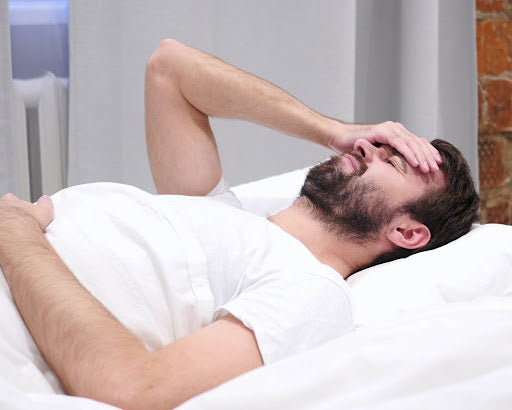If you’re feeling tired and unrested after a full night’s sleep, it may indicate that there’s an issue. More often than not, individuals with sleep apnea don’t know they have the condition until a partner points out the warning signs.
By understanding the warning signs of sleep apnea, you’re more likely to catch your condition early on and get the necessary treatment to sleep more soundly throughout the night. ApneaMed is here to walk you through everything you need to know about the warning signs of sleep apnea.
What Is Sleep Apnea?
Sleep apnea is a sleep disorder caused by the collapsing of soft tissue in the individual’s throat. When the soft tissue collapses, it blocks the airway and leaves the individual choking or gasping for air in an attempt to reopen the airway. The cessation of breathing can last anywhere from a few seconds to a few minutes.
Frequently, the individual isn’t aware that they’re choking in their sleep and is often noticed by a family member or partner who witnesses them stop breathing. If left untreated, sleep apnea can lead to other health problems such as heart disease, high blood pressure, diabetes, and stroke, which is why it’s essential to undergo a sleep study if you suspect you have sleep apnea.
3 Warning Signs of Sleep Apnea
If you or your partner suspect that you have sleep apnea, keep an eye out for these warning signs that indicate it’s time to take a sleep apnea test.
1) You’re a Noisy Sleeper
Because you stop breathing when you have sleep apnea, you tend to make many noises throughout the night. If you wake up to yourself choking or your partner constantly complains about you being a noisy sleeper, it may be an indication that your airway is obstructed due to the soft tissue in your throat collapsing.
In an attempt to reopen the blocked airway, you may find yourself snoring, choking, or gasping for air.
2) You Move A Lot In Your Sleep
Do you wake up in a different position every morning? Does your partner complain about you tossing and turning all night long? When you have sleep apnea, your airway becomes blocked and causes you to stop breathing. As a result, you may move around in your sleep in an attempt to open up your airway without even realizing that you’re doing it!
3) You Feel Unrested After a Full Night’s Sleep
Even after a full night’s sleep, most patients with sleep apnea will still feel fatigued and unrested as they go about their day. Over time, poor quality of sleep can wreak havoc on your physical and mental health.
Whether you find yourself getting headaches throughout the day, unable to concentrate at work, or feeling more irritable and getting mad over minor things, you may not be getting the quality sleep you need to go about your day.
Additional Symptoms of Sleep Apnea
Along with these warning signs, there are symptoms of sleep apnea you can watch out for that may indicate you are suffering from sleep apnea. These symptoms include:
- Dry mouth
- Headaches
- Sore throat
- Low energy
- Lack of concentration
- Insomnia
- Irritable
If you’re having difficulty getting a good night’s rest, it’s time to consider getting tested for sleep apnea. For a convenient and affordable option, ApneaMed offers a home sleep study that can be self-administered in the comfort of your own home — saving you both time and money.
ApneaMed offers various home sleep tests and in-home breathing equipment to help you treat your obstructive sleep apnea. Contact our team to learn more.

